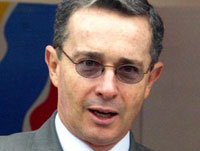Colombia captures top rebel commander
Bogota reassumes military actions against guerrilla groups after failed release of hostages.

The Colombian army announced on Wednesday that has captured a senior commander of the country’s second largest rebel group, the National Liberation Army (or ELN) as Bogota reassumes military actions against guerrillas halted last week to allow failed international operation aimed at the release of hostages.
Carlos Marin Guarin, who uses the nom de guerre "Pablito," was detained Monday in the capital of Bogota after months of intelligence gathering, army chief Gen. Mario Montoya said. He did not give further details on the operation. According to the government led by President Alvaro Uribe, this is a “major blow to the guerrillas that could push them closer to a peace deal”.
Defense Minister Juan Manuel Santos called the capture "the most important ever" of a leader of the ELN, as the group is known by its Spanish initials. He added that it could help tricky peace negotiations with the rebels. "We know that on various occasions (Guarin) prevented the ELN's central command from signing a peace treaty with the government," Santos said.
However, the largest rebel group FARC announced last week a new military offensive against Colombian authorities, after failing to release three hostages as they had promised to Venezuelan President, Hugo Chavez. The frustration of the operation was subject of controversies between the FARC and Uribe’s government, as rebel said they could not deliver the hostages to the international commission because Bogota interfered. It became known later that one of the hostages the FARC were supposed to release –a three year-old boy born in captivity- was already free under custody of Colombian authorities.
Government and ELN negotiators have been holding exploratory peace talks on-and-off since December 2005 in Cuba. Venezuelan President Hugo Chavez has offered to sponsor future negotiations on how to implement diverging proposals for a cease-fire. The dwindling ELN, with 3,000 fighters, is considered a pale shadow of the much larger and more potent Revolutionary Armed Forces of Colombia, or FARC.
However, the Colombian government said it is not longer ready to admit foreign mediations if they are not well informed of the situation in the country. Ties between Bogota and Caracas have been seriously damaged after Chavez accused Uribe of “obstructing” the release of hostages.
Hernan Etchaleco
Subscribe to Pravda.Ru Telegram channel, Facebook, RSS!




